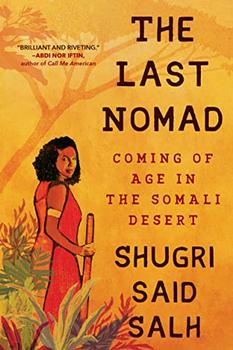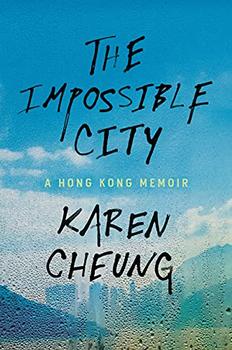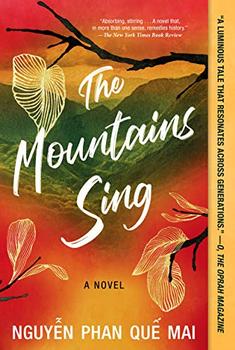Summary | Excerpt | Reading Guide | Discuss | Reviews | Beyond the book | Read-Alikes | Genres & Themes | Author Bio

Coming of Age in the Somali Desert
by Shugri Said SalhSomali-born Shugri Said Salh's debut memoir The Last Nomad is a triumph of storytelling that illuminates the nomadic culture of her ayeeyo (grandmother). Salh, who fled her country due to civil war and now works as a nurse in California, portrays an enduring connection with the Somali landscape, along with a legacy of poetry and practical skills. The scope of The Last Nomad is much wider than a childhood memoir or a refugee survival story. The author has recreated intimate details of Somali traditions; she also layers elements of history, ecology and politics in an account that will appeal to a wide range of readers and book groups.
Born in 1974 to a town-dwelling, English-educated father and a nomadic, illiterate mother, Salh came of age during a time of rapid social change. Her family dynamics reflected an ancient legacy of birth-clan alliances, expectations and conflicts. Her father, married many times, was responsible for 23 children. At about age six, Salh was chosen to live with and assist her elderly maternal grandmother, a nomadic herder. She learned how to tend goats and camels, how to pack and move an aqal (nomadic hut, see Beyond the Book) on a camel, how to secure milk and water, how to be strong.
The narrative is packed with details about nomadic culture, including centuries of endurance shaped by powerful cycles of abundance and drought, transience and settlement. Salh describes how, during her early years among her grandmother's traditions, she first connected with the creative force of her own imagination.
One day, while herding my goats, I saw a straight, thin line in the sky above me. I stopped what I was doing and watched it. Who is up there making that line in the sky? It was so straight and so long it completely captured my attention. I knew about clouds, because studying rain patterns was important to nomads' survival. However, this line was completely different, and I instantly knew something had to be responsible for making it. This line made me wonder about the world that lay beyond mine, the same way the shining stars in the black night sky did as I slept in the open space in front of my ayeeyo's hut.
At this time, the author didn't realize that her own nomadic path to survival would lead across oceans and include traveling by jet.
Following a long tradition that almost all Somali girls experienced at the time (and which remains prevalent despite a constitutional ban against it introduced in 2012), Salh and her sisters endured a circumcision ritual involving female genital mutilation (FGM) performed by their clan's elder women. The book does not shy away from painful details here, but the author portrays them with nuanced cultural context as well as a nurse's precise medical terms. She also honestly reveals personal anatomical complications, eventual surgical repair and a determination to interrupt FGM and other misogynistic traditions on a global scale.
Alongside these difficult details, Salh also offers moments of humor. When recounting her grandmother slaying a male camel calf, she reflects, "This was a rare instance of nomadic life where it was worse to be male. That baby camel was a male, and therefore expendable. We only needed a few males for mating and carrying our huts and water. Otherwise, we valued our camels for their milk."
Salh's world was soon to undergo many changes. Her mother, who had birthed nine children and operated her own business as a trader, died suddenly of malaria. This left the author essentially orphaned; her father's household was ruled by his iron fist and a different wife. However, she credits her lifelong love of literacy and learning to her father's dedication to education.
Due to a tangle of circumstances when Salh turned nine, she and a few siblings were sent to live at the Families for Children orphanage school in Mogadishu. Several chapters chronicle these challenging years. Opportunities to learn and to forge new "found-family" friendships sustained the young writer through varieties of grief. Salh was rescued from the orphanage by an older sister, Abshiro, and briefly attended a private school, where she interacted with a complicated social hierarchy of materialistic city kids while trying to reconcile her longings for the relative scarcity and natural harmony of nomadic existence. When ordinary life in Mogadishu was destroyed by civil war, she accompanied family members who escaped to Kenya. They found temporary respite at a refugee camp, then resettled in Nairobi. By now, extended family was scattered, and her beloved grandmother remained in Somalia. An elder sister, Saada, gained asylum in Canada and eventually sponsored Salh and other siblings as refugees.
Ottawa presented new obstacles: fear of escalators, navigating the bus system, learning English, urban poverty, winter weather. For Salh, the particular dynamics of living in her sister's household were compounded by more universal demands of settlement in a city filled with migrants of diverse languages and cultures. Networks of clan and community expanded in unexpected ways to reveal new pathways and layers of identity. One day, while studying at Ottawa University, Salh met Selehdin, an Ethiopian refugee. They eventually fell in love, married, moved to California and raised three children together. While the author's storytelling is skilled and compelling throughout the book, a reference map and cast of characters would have been useful for readers to follow the twists and turns, relationships and travels described.
This memoir will likely spark book group discussions about provocative themes: survival, transience, family ties, cultural tradition, female empowerment, immigration, war and peace, climate change, the power of story, proverbs, ancestral wisdom. As a testimony to human resilience as well as a love letter to Somalia and its people, The Last Nomad delivers accessible insights. In one lifetime, the author has grown through many roles and triumphed over myriad trials. Shugri Said Salh's hard-won wisdom endures in her sometimes painful, yet always riveting and entertaining book.
![]() This review was originally published in The BookBrowse Review in September 2021, and has been updated for the
August 2022 edition.
Click here to go to this issue.
This review was originally published in The BookBrowse Review in September 2021, and has been updated for the
August 2022 edition.
Click here to go to this issue.

If you liked The Last Nomad, try these:

by Karen Cheung
Published 2022
A boldly rendered - and deeply intimate - account of Hong Kong today, from a resilient young woman whose stories explore what it means to survive in a city teeming with broken promises.

by Nguyen Phan Que Mai
Published 2021
Winner of the 2020 BookBrowse Debut Award
The Mountains Sing tells an enveloping, multi-generational tale of the Trần family, set against the backdrop of the Việt Nam War. "Both vast in scope and intimate in its telling ... Moving and riveting." - Viet Thanh Nguyen, author of The Sympathizer, winner of the Pulitzer Prize
Wisdom is the reward you get for a lifetime of listening when you'd rather have been talking
Click Here to find out who said this, as well as discovering other famous literary quotes!
Your guide toexceptional books
BookBrowse seeks out and recommends the best in contemporary fiction and nonfiction—books that not only engage and entertain but also deepen our understanding of ourselves and the world around us.